Seoul Mayor Park wins reelection
Voter turnout reaches 56.8%, highest in 16 years
By (공용)코리아헤럴드Published : June 4, 2014 - 23:09
Early results indicated Seoul Mayor Park Won-soon would score a resounding win against his conservative rival Chung Mong-joon as the ruling Saenuri Party and main opposition New Politics Alliance for Democracy battled it out in the local elections with seven of the 17 major mayoral and gubernatorial races being contested tightly.
Buoyed by the highest-ever early voting rate, this year’s local elections are to see the highest voter participation since the first local elections were held in 1995. As of 7 p.m., the National Election Commission placed the voting rate at 56.8 percent, the highest since 1998.
Buoyed by the highest-ever early voting rate, this year’s local elections are to see the highest voter participation since the first local elections were held in 1995. As of 7 p.m., the National Election Commission placed the voting rate at 56.8 percent, the highest since 1998.
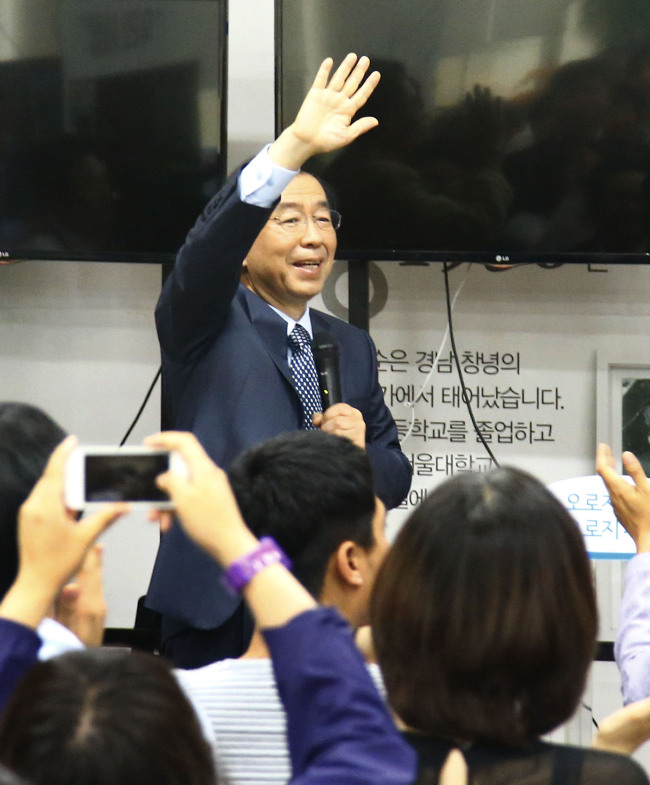
Voting took place at 13,665 polling stations across the country, with each voter casting seven ballots to select 3,952 chiefs and legislators for metropolitan, provincial and lower-level administrative offices. Wednesday’s election also saw the selection of new education superintendents for the 17 metropolitan cities and provinces.
With the exception of Seoul, exit polls were too close to call for many of the most sought-after regions. The exit polls showed the Incheon mayoral race to be the closest with Saenuri Party’s Yoo Jeong-bok leading NPAD’s Song Young-gil by only 0.3 percentage points. The competition for the Busan and Daejeon mayors’ posts, and the gubernatorial races for Gyeonggi, Gangwon and the Chungcheong provinces were also too close to call.
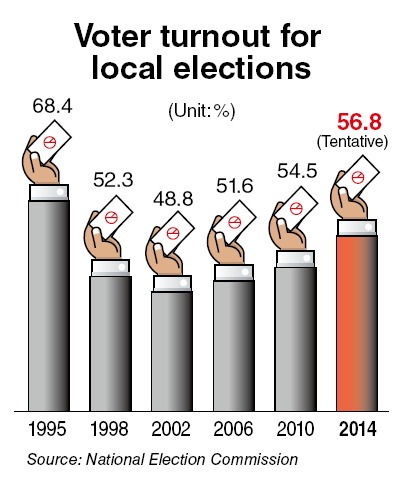
The exit polls, conducted by the three terrestrial broadcasters, showed that NPAD’s Park would sail into his second Seoul mayor term outpacing Chung by nearly 10 percentage points.
As votes were counted, Park’s win became increasingly more likely with nearly 58 percent of the counted ballots picking Park as of 11 p.m. At the time, 6.25 percent of the votes had been counted.
The exit poll figures were met by cautious words of victory from Park’s aides.
“As (Park) maintained a lead in various surveys, (the exit poll result) was expected in some ways,” Park’s campaign spokesman Rep. Jin Sung-joon said.
“If victory is confirmed, then that is the result of Seoul citizens seeing the truthfulness in Park’s promise that he will ‘always remain by the citizens’ side.’”
The NPAD was also seen as having the advantage in four other regions including Sejong City and the Jeolla provinces.
In addition, key pro-Roh Moo-hyun figure Ahn Hee-jung was heading for his second term as South Chungcheong Province governor gaining 51.5 percent of the votes counted by 11 p.m.
Gwangju, despite earlier worries that NPAD’s Yoon Jang-hyun was at a disadvantage against Kang Woon-tae, also appears to be in the bag for the main opposition. The exit figures placed Yoon nearly 28 percentage points ahead of Kang, despite pre-election surveys predicting a tight race in the southwestern city.
At 11 p.m., Yoon was leading Kang by about 21 percentage points in the votes counted so far.
If Yoon’s election is confirmed, the NPAD’s leadership will avoid the massive fallout that was predicted should Yoon, handpicked by NPAD co-chairman Rep. Ahn Cheol-soo, lose to Kang.
Pundits had predicted that a win for Kang, who left the NPAD in protest of Yoon’s nomination, could effectively end Ahn’s political career.
While disaster was avoided, the NPAD is not home free, with the mixed exit poll figures indicating that its strategy of using the local elections to “pass judgment” on the Park Geun-hye administration is likely to lose steam.
The elections were seen as a referendum for the administration in the wake of the April 16 ferry disaster that left more than 300 people dead or missing. The government has been sharply criticized for its poor handling of the accident.
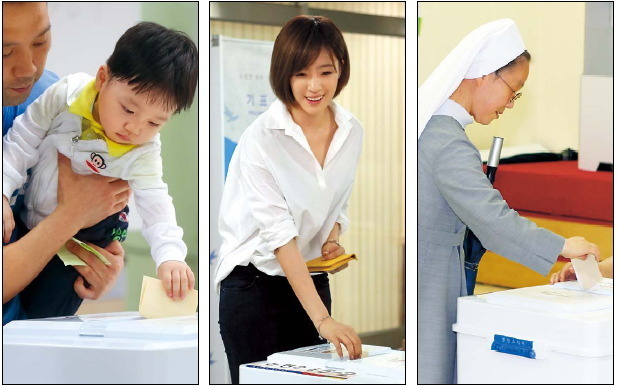
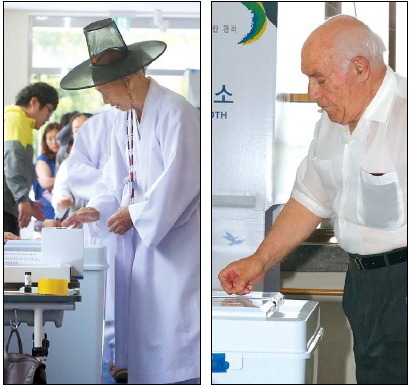
As such, the main opposition had appealed for voters’ support for its candidates emphasizing safety and accusing the government and the ruling party of incompetence and irresponsibility.
Throughout the election day, the NPAD repeated its slogans while the ruling party appealed for voters to protect and give strength to the president.
“These are elections that question the fundamentals of democracy ― whether the nation and the people need to exist for the president or if the president needs to exist for the people and the country,” NPAD spokesman Park Gwang-on said.
Similar sentiments were echoed by NPAD cochairman Rep. Kim Han-gil.
“The world does not get better by itself. It changes by voting. The people’s power will usher in a new Korea. (I) trust the people,” Kim said after casting his vote Wednesday.
The Saenuri Party, which called on the public to support the Park Geun-hye administration, appeared cautious.
“Overall, (Saenuri Party candidates’ ratings) were on the rise as we got closer to the voting day, but due to problems such as Unified Progressive Party candidates’ resignations, the results should be monitored. There are many very close races,” Saenuri Party floor leader Rep. Lee Wan-koo said.
In the days leading up to Election Day, a number of UPP candidates folded their campaigns, citing the need for the progressive bloc to defeat the ruling party. The move incited heavy criticism from the Saenuri Party that accused the UPP and NPAD of collusion.
As for the ruling Saenuri Party’s candidates, the exit figures placed them in comfortable leads in Daegu, Ulsan, the Gyeongsang provinces and Jejudo Island.
Former conservative leader Hong Joon-pyo was projected to take South Gyeongsang Province governor’s post in a landslide victory, while Kim Kwan-yong and Won Hee-ryong were expected to win North Gyeongsang Province and Jeju, respectively.
In addition, former Saenuri Party policy chief Kim Ki-hyun’s election as the next mayor of Ulsan was effectively confirmed.
In Busan, another conservative stronghold in the Gyeongsang region, the results were panning out in line with pre-election survey results that predicted a close race for the Saenuri Party candidate.
The exit polls placed Saenuri Party’s Suh Byung-soo in the lead by 3.6 percentage points over progressive independent Oh Keo-don.
By Choi He-suk (cheesuk@heraldcorp.com)
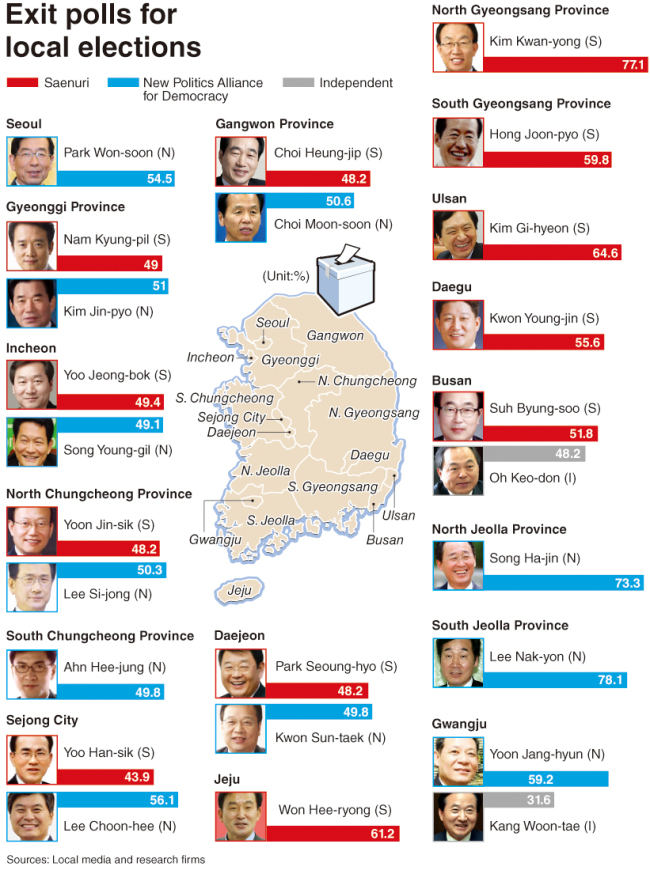
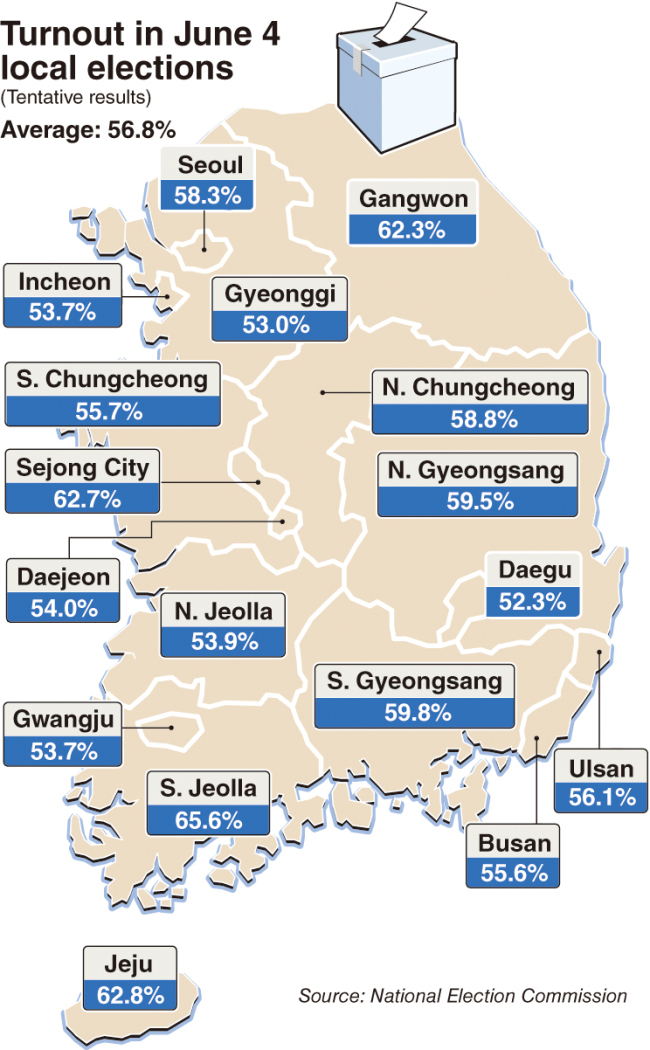








![[KH Explains] How should Korea adjust its trade defenses against Chinese EVs?](http://res.heraldm.com/phpwas/restmb_idxmake.php?idx=644&simg=/content/image/2024/04/15/20240415050562_0.jpg&u=20240415144419)










![[Today’s K-pop] Stray Kids to return soon: report](http://res.heraldm.com/phpwas/restmb_idxmake.php?idx=642&simg=/content/image/2024/04/16/20240416050713_0.jpg&u=)